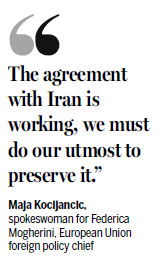Iran FM heads to Brussels to save nuclear agreement
Washington's exit from deal leaves uncertainties for German industries
BRUSSELS - Iran's foreign minister arrived in Brussels on Tuesday on the final leg of a global tour rallying diplomatic support for the country's nuclear deal with world powers after US President Donald Trump administration's abrupt withdrawal.
Mohammad Javad Zarif was scheduled to meet with his counterparts from Britain, France and Germany - the three European nations involved in the landmark deal who are incensed by Washington's abandonment of the pact.
After long negotiations, Iran agreed in July 2015 to freeze its nuclear program in return for the repeal of punishing international sanctions.

But last week, Trump announced he was leaving the deal and reimposing sanctions.
Zarif has since embarked on a whirlwind global tour, visiting both China and Russia, the two other signatory nations, in a bid to bolster support.
Washington's decision to go against its European allies' advice and abandon the deal has pushed them closer to Beijing and Moscow as diplomats scramble to keep the pact alive.
"The agreement with Iran is working, we must do our utmost to preserve it," Maja Kocijancic, spokeswoman for the head of European diplomacy Federica Mogherini, said ahead of Zarif's arrival.
Iran has said it is preparing to resume "industrial-scale" uranium enrichment "without any restrictions" unless Europe provides solid guarantees that it can maintain trade ties despite renewed US sanctions.
On Monday, Zarif met with his Russian counterpart Sergei Lavrov, a day after visiting Beijing.
"The final aim of these negotiations is to seek assurances that the interests of the Iranian nation will be defended," Zarif said at the start of a meeting.
After the talks, Zarif praised the "excellent cooperation" between Moscow and Teheran and said Lavrov had promised to "defend and keep the agreement".
Lavrov, for his part, said Russia and Europe had a duty to "jointly defend their legal interests" in terms of the deal.
On Monday, Zarif also sent a letter to the United Nations in which he accused the US of showing a "complete disregard for international law" in pulling out of the deal.
Russian President Vladimir Putin has already spoken with German Chancellor Angela Merkel and Turkey's President Recep Tayyip Erdogan about efforts to save the accord, after voicing his "deep concern" over Trump's decision.
Great concern
Meanwhile, German entrepreneurs expressed great concern about their business in Iran after Trump announced the decision to withdraw from the agreement.
"We will now very carefully analyze the sanction-related steps announced by the United States," German conglomerate Siemens AG said in a statement on Monday.
Siemens, based in Munich and the largest industrial manufacturing company in Europe, signed a contract in October 2016 to upgrade Iran's railway network and supply components for 50 diesel-electric locomotives.
Siemens said it will comply with all the export controls that may emerge.
Chief Executive Joe Kaeser said in an interview with CNN on Sunday that according to his understanding, Siemens could not do any new business in Iran or else it could face sanctions from the US.
Siemens's concerns were widely shared by other German companies that are active in or with Iran.
German carmaker Volkswagen, which resumed its exports to Iran in 2017, said it was closely monitoring and reviewing the political and economic development in the region.
Another German automaker, Daimler AG, also said it would analyze the impact of the US decision.
According to official figures, exported German goods to Iran increased by around $476 million to $3.57 billion in 2017 and German-Iranian commerce has soared by 42 percent since sanctions were loosened in 2016.
White House national security adviser John Bolton told the press on Sunday that "it's possible" that European companies doing business with Iran would be subject to sanctions.
Afp - Xinhua
(China Daily 05/16/2018 page11)














